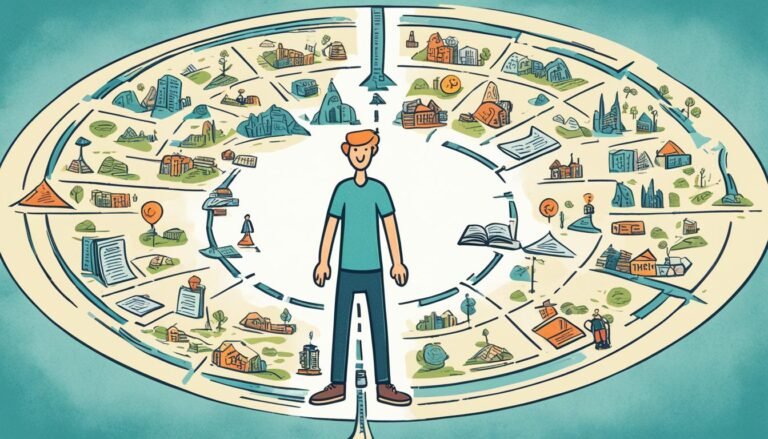The Strength of Vulnerability: Opening Hearts to Connection and Growth
“Vulnerability is not winning or losing; it’s having the courage to show up and be seen when we have no control over the outcome.” – Brené Brown
Welcome to a journey into the power of being vulnerable. In a world obsessed with seeming perfect, being open can lead to growth and real relationships. Being vulnerable means showing up as who we truly are. It’s about coming face to face with our fears, releasing all control, and welcoming the unknown. Through this, we allow our true selves to shine and let the beauty of life surprise us.
Vulnerability isn’t a sign of weakness. It highlights our emotional wisdom and our commitment to living fully. It’s about owning our flaws, facing our fears, and believing in the power of being open. Choosing to be vulnerable edges us closer to others, boosts empathy, and enriches our lives in ways we can’t even imagine.
In the upcoming articles, we’ll journey through various aspects of vulnerability. We’ll learn how it shapes our personal and work lives. Understanding the value of imperfection, growing our emotional smarts, and gaining strength from tough times will be central. Plus, we’ll see how vulnerability plays a key role in powerful storytelling, effective leadership, and the everyday moments that make up our lives.
Key Takeaways:
- Vulnerability is not a weakness, but a courageous act of showing up authentically.
- Embracing vulnerability cultivates emotional intelligence and wholehearted living.
- Through vulnerability, we build deeper connections and empathy with others.
- Vulnerability is a pathway to resilience and personal growth.
- Sharing our stories authentically creates opportunities for connection and belonging.
Embracing Imperfections: Honoring Our Authenticity and Trusting the Process
On our journey to being open, it’s key to recognize and love our imperfections. A lot of people want everything to be perfect. But it’s in our flaws and vulnerabilities that we really connect with others and ourselves.
Being real is very important too. When we’re truly ourselves, we build a space filled with trust and understanding. In this space, strong connections can grow. It’s about dropping the fake fronts and showing who we really are, faults and all.
“Authenticity is the daily practice of letting go of who we think we’re supposed to be and embracing who we are.”
Trusting vulnerability is also vital. It means knowing that showing our true selves can be hard. But it’s also how we grow and change.
Like flowers opening up, we too can trust that being open will make us better people. It takes bravery to move forward not knowing what’s next. But that’s how we find our inner power.
It’s not easy to accept our flaws and be authentic. However, doing so is crucial for building real bonds and growing as individuals. Being open helps others be open too, creating safe spaces for all.
The next part will look at how emotional intelligence affects our ability to be open. We’ll see how showing empathy and kindness can make us closer to each other and ourselves.
Building Emotional Intelligence: Nurturing Empathy and Compassion
Emotional intelligence is key to both personal and leadership development. It lets us embrace vulnerability and show empathy. These qualities help in creating a supportive space for open talks and connections to thrive.
Understanding how others feel is what empathy is about. It lets us connect deeply with people. To be empathetic, we must imagine walking in someone else’s shoes. This action often leads to stronger bonds and a deeper sense of trust.
Compassion means caring deeply about others’ suffering. It drives us to act with kindness and understanding. When we show compassion, people feel safe to share their struggles.
Leaders with emotional intelligence value empathy and compassion. They know these traits build strong teams. By fostering empathy and compassion in themselves and their team, they create a culture that’s accepting and genuine.
“Empathetic leadership is about recognizing the emotions of others and responding with understanding and compassion.” – Simon Sinek
Leading with empathy and compassion creates an environment where people feel safe. They can freely share their thoughts and ideas. This approach builds trust and improves the workplace.
To grow in emotional intelligence, become more self-aware. Listen to others and really understand their feelings. This helps create a culture where support, empathy, and personal growth are valued.
Benefits of Emotional Intelligence in Leadership:
- Improved decision-making based on a deeper understanding of team members’ needs and emotions
- Enhanced teamwork, collaboration, and innovation
- Inspired and motivated team members who feel seen, heard, and supported
- Increased employee engagement and satisfaction
- Effective conflict resolution and problem-solving
- Creation of a positive work culture built on trust and psychological safety
By improving emotional intelligence and embracing vulnerability, you can lead with empathy. This approach cultivates deep connections, authenticity, and growth in your team and organization.
Resilience through Hardship: Finding Strength in Vulnerability
In tough times, bouncing back shows our strong spirit. It might seem odd, but being open about our struggles helps us find hidden strength.
Being vulnerable teaches us valuable lessons and helps us know ourselves better. It’s in these moments that we realize how strong and tough we really are.
Embracing vulnerability shows bravery, not weakness. It’s about admitting our challenges and tackling them with courage.
Accepting vulnerabilities lets us face life’s challenges with understanding. It prepares us to handle tough times with ease and courage.
“Resilience is about facing tough situations, not avoiding them. Being open about our struggles helps us dig deep and find the strength to overcome.”
Building resilience is possible for anyone. It involves dealing with tough feelings, asking for help, and getting stronger each time we face a challenge.
We should know, facing challenges alone is not necessary. Talking to others can make a big difference. It helps us connect, feel understood, and build our strength together.
Finding Strength in Vulnerability: Key Takeaways
- Embracing vulnerability during tough times lets us find our inner might.
- Vulnerability shows courage, not weakness, and is vital for self-acceptance.
- A mindset open to vulnerabilities helps us overcome life’s hurdles with poise.
- Resilience grows by dealing with tough emotions and leaning on others for support.
- Sharing our stories and connecting deeply with others boosts our resilience and sense of belonging.
The Power of Brave Storytelling: Sharing Our Truths to Create Connection
Sharing our stories can be a bold move that affects not just us, but those who listen too. It helps us connect deeply with others, making them feel understood and part of something.
Telling a brave story is more than just words. It means being open about our struggles and achievements, letting others see the real us. This openness helps others share their stories too.
By telling our story, we can make hearts and spirits lighter. We invite others to understand our journey and find solace in shared experiences.
Through our stories, we can motivate and enlighten others who find echoes of their own in what we tell.
“When we share our stories, what it does is it opens up the possibility that we can connect with each other and understand each other better.” – Oprah Winfrey
Brave storytelling aids us in understanding ourselves and growing. It allows us to find truths, look at life in new ways, and begin the healing process. This, in turn, pushes others to begin their own path of reflection and courage.
Look at the image below to see how powerful brave storytelling can be:
This captivating image depicts the essence of brave storytelling and its ability to create connection. The image emphasizes the importance of vulnerability and authenticity in sharing our truths, as represented by the open book.
The Impact of Brave Storytelling
Brave storytelling can challenge the world to be better. It tells stories that break barriers and build a more understanding community.
By telling our stories, we can make others feel safe in sharing their own. This ripple effect of courage can lead everyone to grow and be stronger.
Embracing Brave Storytelling in Your Life
Here’s how you can start your journey in brave storytelling:
- Set aside time to reflect and write down your stories.
- Listen actively to others’ stories and provide a safe space for sharing.
- Share your tales in groups or online to connect with others.
- Be open about your wins and struggles to help others learn from you.
Brave storytelling can elevate your life and those around you. It’s a key that unlocks deeper connections and understanding, which can lead to a better world.
So, breathe in and trust your story. The power of brave storytelling awaits you.
Empathetic Leadership: Leading with Vulnerability and Connection
Today’s business world keeps changing. Leadership is more than just power now. It’s about making a work culture that’s caring and real. Leaders who use empathy can make everyone feel they matter and are free to be themselves at work.
Vulnerability is key in empathetic leadership. It opens up honest talks and helps people bond. Leaders who are okay with not being perfect make it safe for others to share what’s on their minds. This helps everyone trust one another more.
Being open about your own flaws and feelings is important. It lets others see it’s okay to be themselves. This kind of leadership promotes realness, making it easier for the whole team to do their best work.
Empathetic leaders get why emotional intelligence is important. They care about how others feel and make an effort to connect. This makes their support really meaningful.
Empathetic leaders listen closely to their people. They want to hear everyone’s ideas and feedback. They create a welcoming space where different viewpoints are respected. This openness helps the team be more creative and productive.
“True leadership is not about being in control; it’s about being connected. It’s about being vulnerable enough to share your experiences, fears, and aspirations. By doing so, you create the foundation for a truly empowered team.”
They also make sure to notice their team’s good work. They give helpful feedback and cheer on every achievement. This helps their team do even better.
By being open and building connections, empathetic leaders make their teams stronger. They help create a place where everyone works together well. This leads to a team that believes in itself and does great things.
Benefits of Empathetic Leadership:
- Enhanced trust and authenticity within the team
- Improved communication and collaboration
- Increased employee engagement and satisfaction
- Boosted innovation and creativity
- Greater resilience and adaptability
Empathetic leaders see that being vulnerable isn’t bad. It’s how they reach and care for their team. Understanding and helping each other grows from here. This makes work a better, kinder place for everyone.
Cultivating Wholehearted Living: Embracing Vulnerability in Everyday Life
Embracing vulnerability isn’t a one-time task; it’s a lifestyle that fosters personal growth. It encourages deep connections with others. Wholehearted living means choosing to be open in our daily lives. This lets us be true to who we are, brave, and strong in facing life’s challenges.
So, what steps can we take to embrace wholehearted living?
1. Practice Self-Reflection:
Reflection is key. Take moments each day to look at your feelings and thoughts. This helps you see when you’re vulnerable. Knowing yourself lets you be kind and understanding when facing these times.
2. Create a Supportive Community:
It’s vital to have supportive friends. Surround yourself with those who support your journey. Look for those who also aim for honesty, understanding, and growth.
3. Embrace Imperfections:
Being human means we’re not perfect. It’s important to accept this. Embracing our imperfections makes us more real. It helps us find our inner strength and connect better with others.
“Vulnerability is not winning or losing; it’s about having the courage to show up and be seen when we have no control over the outcome.” – Brené Brown
4. Practice Mindfulness:
Mindfulness is a great tool. It helps you be aware of your feelings in the moment. This awareness allows you to handle vulnerability in a healthy, non-judgemental way.
5. Take Small Steps:
Start journeying beyond your comfort zone gradually. Share your feelings and fears step by step with others. These little acts of bravery will make you stronger and more open in life.
6. Celebrate Growth and Progress:
Give yourself credit for each brave step you take. Celebrate these moments of growth. They lead you to a more fulfilling life of authenticity and connection.
Choosing wholehearted living means choosing to be vulnerable. It paves the way for a richer life experience. By following these steps daily, we can grow emotionally. This helps us make genuine connections and face life’s joys and sorrows with courage.
The Strength of Vulnerability in Relationships: Nurturing Intimacy and Trust
Vulnerability is a key part of deepening our relationships. It helps us build a strong level of trust and closeness. Through it, we show our true self and encourage the same in others.
Being open about our vulnerabilities lets us make real connections. It shows our honest self without any facades. This honesty makes way for deeper trust and stronger bonds.
Being real is crucial for building trust. It makes others feel safe to do the same. Realness leads to better talks, understanding, and sharing. It helps us connect on a whole new level.
Speaking openly is a great way to build trust. When you share your thoughts and feelings, others feel it’s okay to do the same. This kind of sharing deepens your relationship. It makes you both feel supported.
Being open in relationships means taking emotional chances. These risks help us find deep love and grow together.
It takes courage to be vulnerable. It means facing the chance of not being accepted. But, it also lets us build understanding and love. It offers chances for both to grow.
Through vulnerability, we make strong, lasting relationships. They’re places where we’re free to be ourselves. These relationships support both our own and each other’s growth.
Find the Strength to Be Vulnerable
Vulnerability takes a big leap of faith. But, the bonds we create are priceless, filled with trust and honesty.
- Embrace your imperfections and share your true self.
- Cultivate open and honest communication.
- Support and uplift others as they embrace vulnerability.
- Remember that vulnerability requires courage, but the potential for growth and connection is worth it.
Let’s keep talking about vulnerability, authenticity, and trust. They’re key to our journey. Let’s open our hearts and strengthen the connections that matter most.
Vulnerability and Personal Growth: Stepping into the Unknown
Stepping into the unknown can be scary, but it’s a path to big personal growth. When we’re open to being vulnerable, we find chances to grow. This lets us see more of what we can do.
Moving beyond our usual is how we face our fears. It takes courage. But this bravery lets us leave behind things that kept us small. It shows us a way to grow and change who we are.
“Vulnerability is not winning or losing. It’s having the courage to show up when you can’t control the outcome.” – Brené Brown
To embrace being vulnerable means giving up on always being in charge. It’s about being okay with not knowing everything. Real growth happens when we dare to risk and face the unknown.
Being open about our vulnerabilities helps us learn about ourselves. It makes us think about who we are. Then, we find our strong points and work on getting better. This journey makes us the best we can be.
Growing personally has its tough parts. It demands strength to keep going after failures. But, vulnerability helps us build this very strength. It leads us to bounce back from hard times and grow tougher.
The Strength of Vulnerability in Action:
- Sharing fears with others makes stronger connections and more empathy.
- Being okay with feedback helps us learn and improve.
- Taking chances and trying new things opens us up to more in life.
- Being ourselves with trust in others builds close relationships.
- Not being sure what’s next can make us grow and learn more.
It’s tough to be open and vulnerable, but it’s worth it for growth. By facing the unknown, we open doors to new things. We find our real selves and live a better, more meaningful life.
Conclusion
Vulnerability, surprisingly, makes us stronger. It can deeply change our lives. By showing who we really are and being open, we build stronger connections. These connections help us grow in meaningful ways. Being vulnerable isn’t weak at all. It’s a brave choice that lets us truly live.
Through being open, we get better at understanding and caring for our own and others’ feelings. This makes us connect better. We can be real in our personal and work lives thanks to this. When tough times come, we find hidden strength in being open. This makes us even stronger afterwards.
Also, sharing our struggles brings people together. It makes us feel like we belong. Being open pushes us to grow by facing fears and welcoming the unknown. This path of knowing ourselves better changes us. It makes us braver, stronger, and more authentic.








